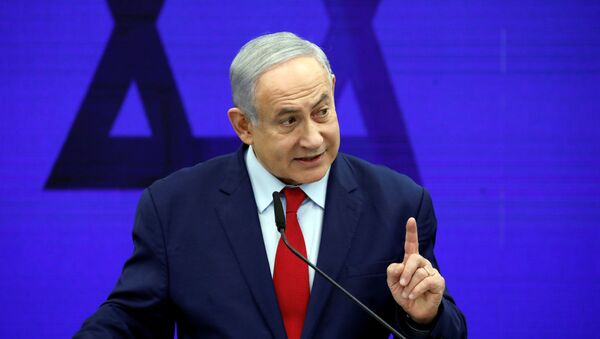During an address on 10 September, Israeli Prime Minister Benjamin Netanyahu vowed to annex the Jordan Valley and northern Dead Sea, if he is re-elected in the upcoming general election on 17 September, calling it the country's "defence wall".
The prime minister further stated that more West Bank settlements will follow suit after the US President Donald Trump administration publishes its "deal of the century" peace plan in full.
"[The US peace plan will be released] immediately after the election. Perhaps even days. It's a great challenge, also a great opportunity. A historic opportunity", Netanyahu said.
The prime minister explained that he could do it right away, but that "out of respect for President Trump", would wait until the peace plan is revealed.
"As much as it is possible, I want to apply sovereignty in the communities and other areas with maximum coordination with the US [...] But there is one place where it is possible to apply Israeli sovereignty immediately after the election. If I receive a clear mandate to do so from you, the citizens of Israel", he added.
Arab League, Jordan, Turkey Condemn Netanyahu's Intentions
His statement was met with harsh criticism from the Arab League, with the organisation indicating that the annexation of parts of the West Bank would violate international law and UN resolutions. The organisation’s secretary-general, Ahmed Aboul Gheit, has said that such a move would only hinder the Israeli-Palestinian peace process.
Jordanian Foreign Minister Ayman Safadi also blasted Netanyahu's pledge, arguing that its fulfilment would "push the whole region towards violence".
Safadi continued by saying that the "unilateral measures he proposes risk killing off the entire peace process and pose a threat to peace and security in the region".
Turkish Foreign Minister Mevlut Cavusoglu also took to Twitter to react to Netanyahu's announcement, slamming his statement as "illegal, unlawful and aggressive":
The election promise of Netanyahu, who is giving all kind of illegal, unlawful and aggressive messages before the election, is a racist apartheid state. Will defend rights and interests of our Palestinian brothers&sisters till the end.
— Mevlüt Çavuşoğlu (@MevlutCavusoglu) September 10, 2019
Netanyahu made similar pledges ahead of the previous election in April, but subsequently failed to form an alliance with other parties to gain a majority government within the one month limit. This, in turn, led to a new election needing to be held, which will take place on 17 September.
In the past few weeks, the Israeli government has reportedly lobbied the Trump administration to recognise Israeli sovereignty over territories it controls in the West Bank. Palestinian officials have repeatedly criticised Israel over its settlement activities in the West Bank.
The announced aim to annex the Jordan Valley and West Bank settlements comes amid recent Israeli policies focused on enforcing its territorial claims with the support of the current US administration. Washington has supported Tel Aviv's claims to Jerusalem in its entirety as its capital, as well as the Jewish state’s claims to the Golan Heights, which Israel has controlled since the 1967 Six-Day War.
Israeli-Palestinian Peace Plan
Netanyahu's announcement comes days after US Secretary of State Mike Pompeo confirmed that Washington would unveil its long-awaited Middle East peace plan after the Israeli election later this month.
The presentation of the US plan, which has been designed by Jason Greenblatt, the outgoing US special envoy for Middle East, and Jared Kushner, President Trump's senior adviser and son-in-law, has repeatedly been delayed. It was supposed to be released over the summer, but was postponed again after Netanyahu failed to form a coalition following the April election and called a fresh vote.
While details of its political portion remain a secret, the White House revealed the economic portion of the plan in June, proposing a $50 billion investment initiative that would establish a global investment fund to boost the Palestinian and neighbouring Arab states economies, as well as to finance a $5 billion dollar transportation corridor to connect the West Bank and the Gaza Strip.
The political portion, meanwhile, was widely expected to lay out a two-state solution, which has been at the epicentre of all previous Israeli-Palestinian negotiations. While Israel has welcomed the Trump peace plan, the Palestinian side has repeatedly pointed out that the US cannout be a mediator in negotiations with Israel, and has boycotted the Trump administration.



